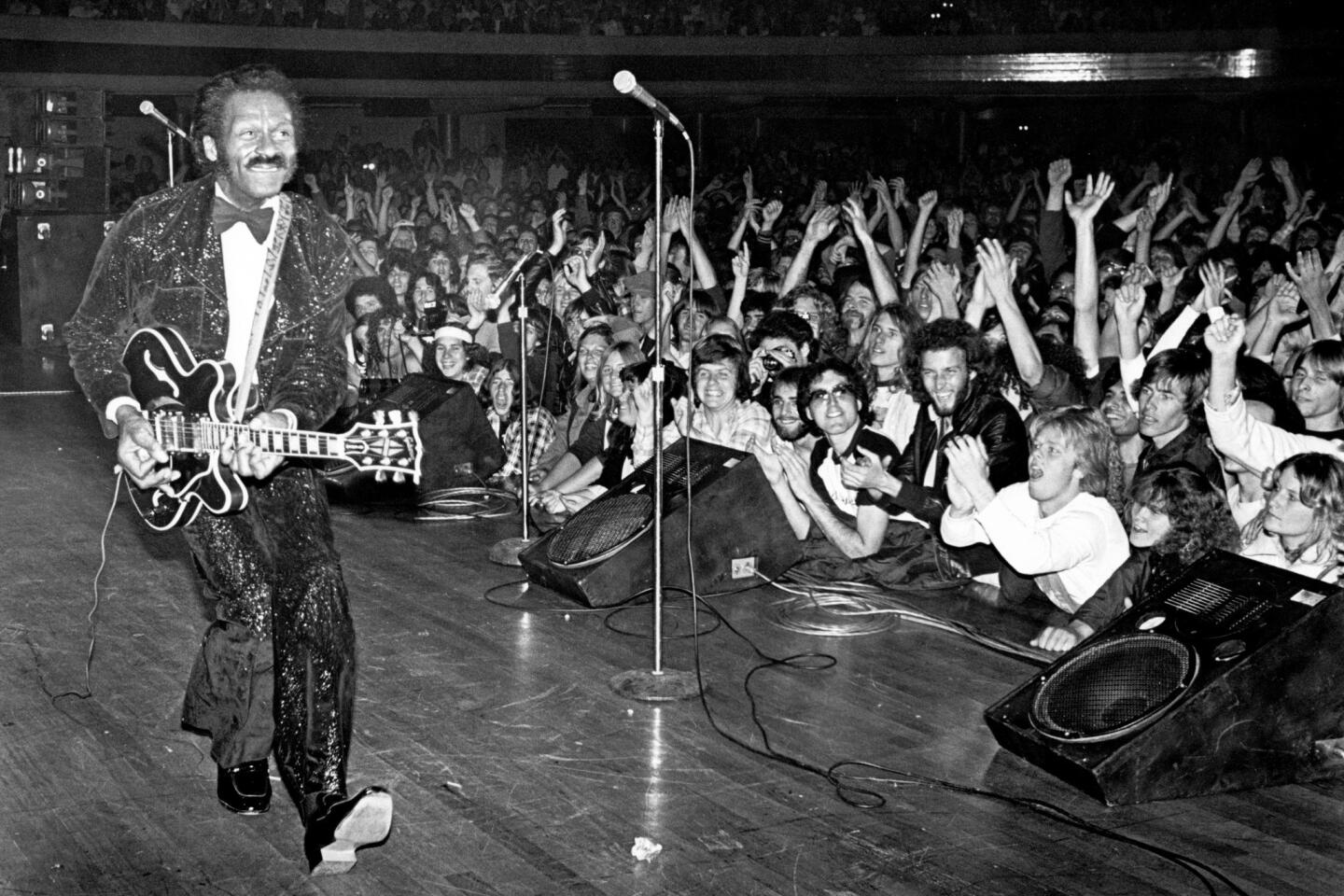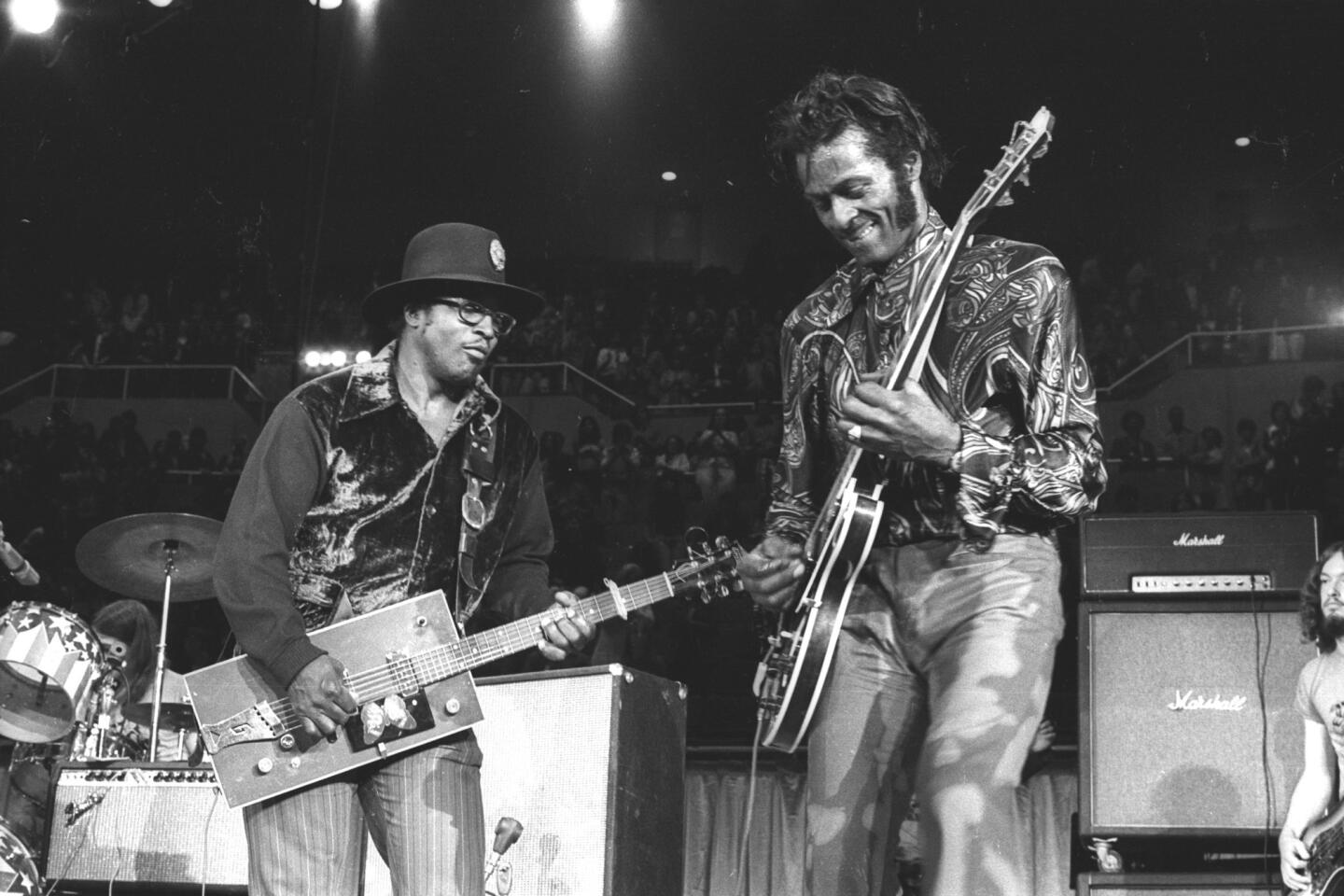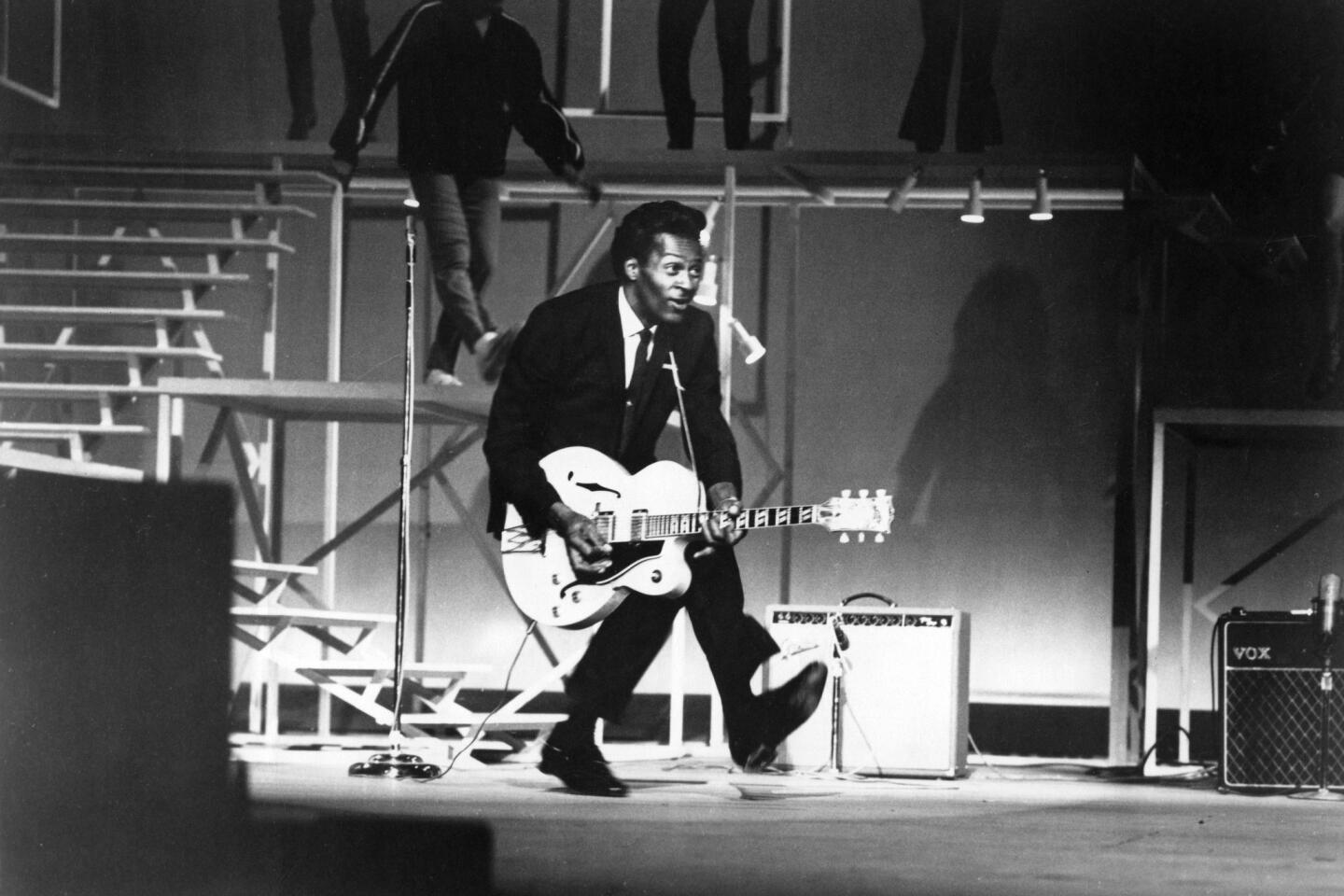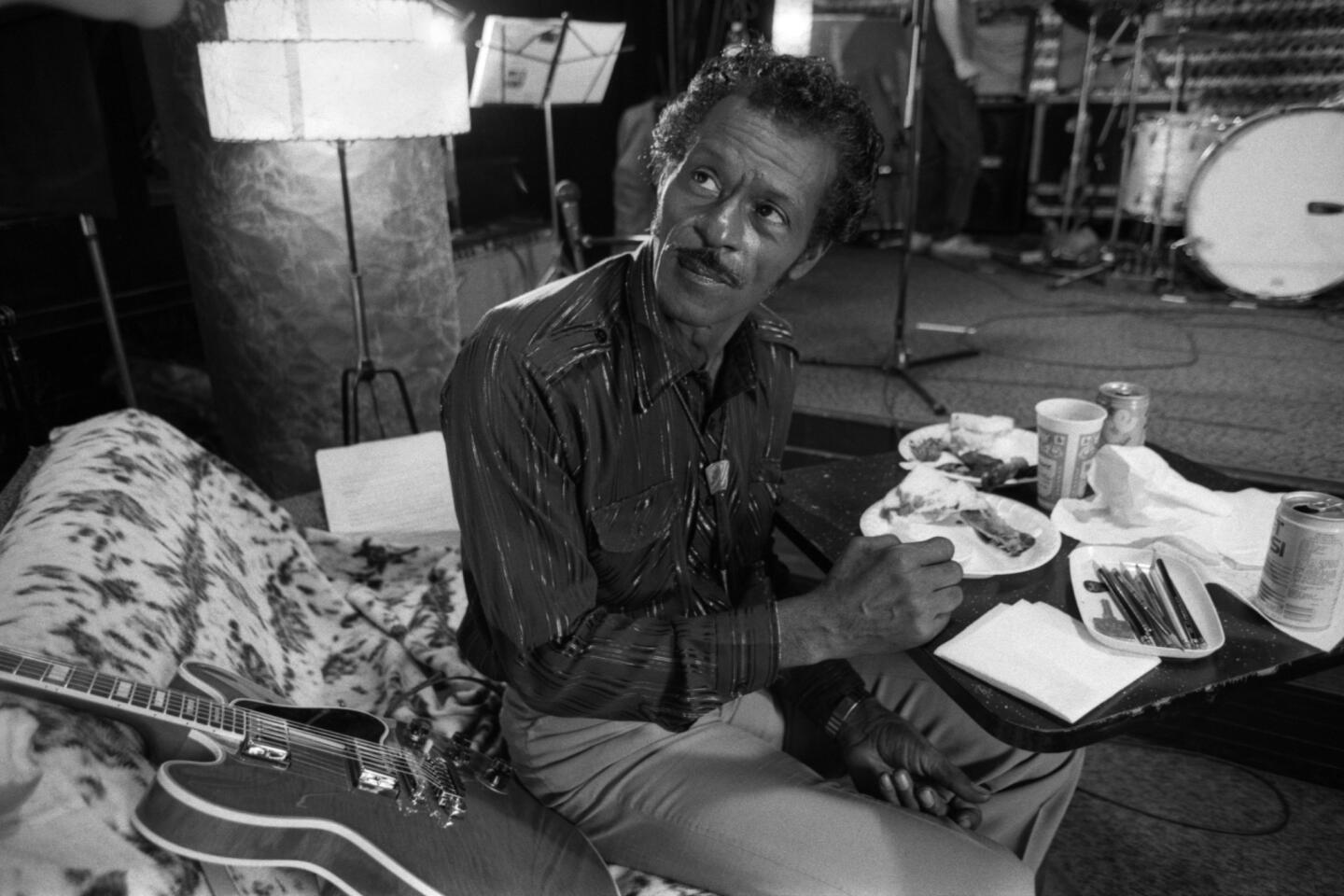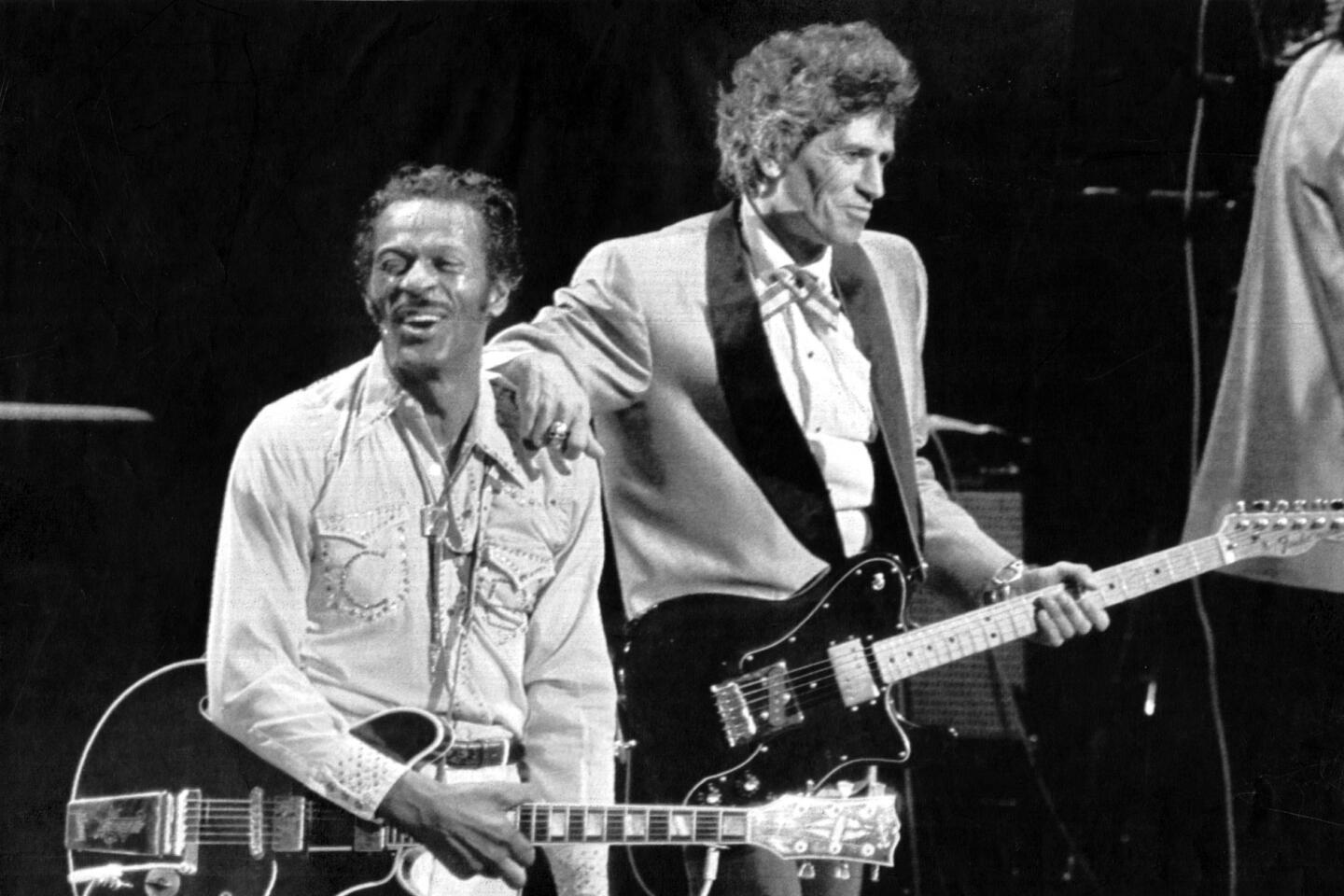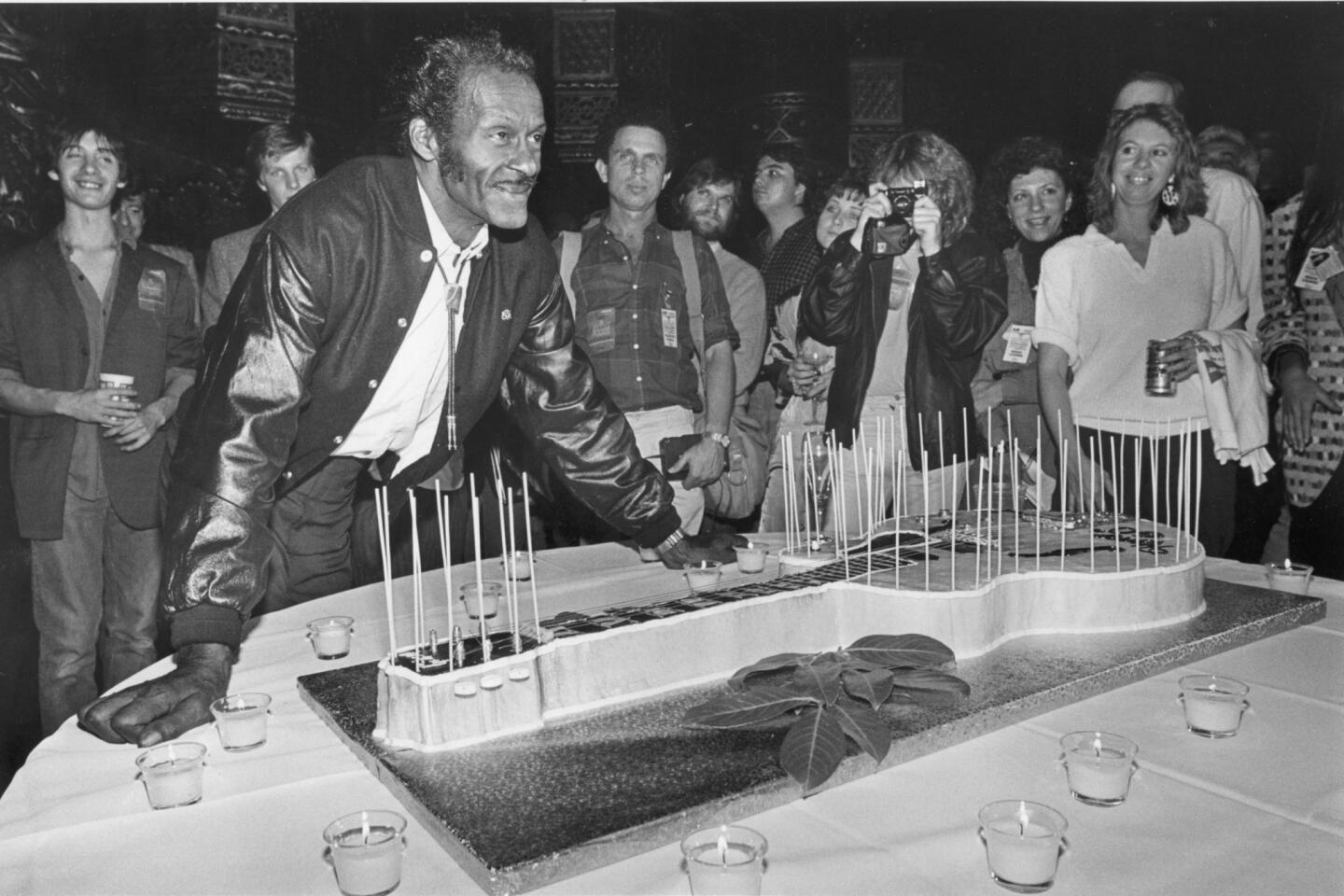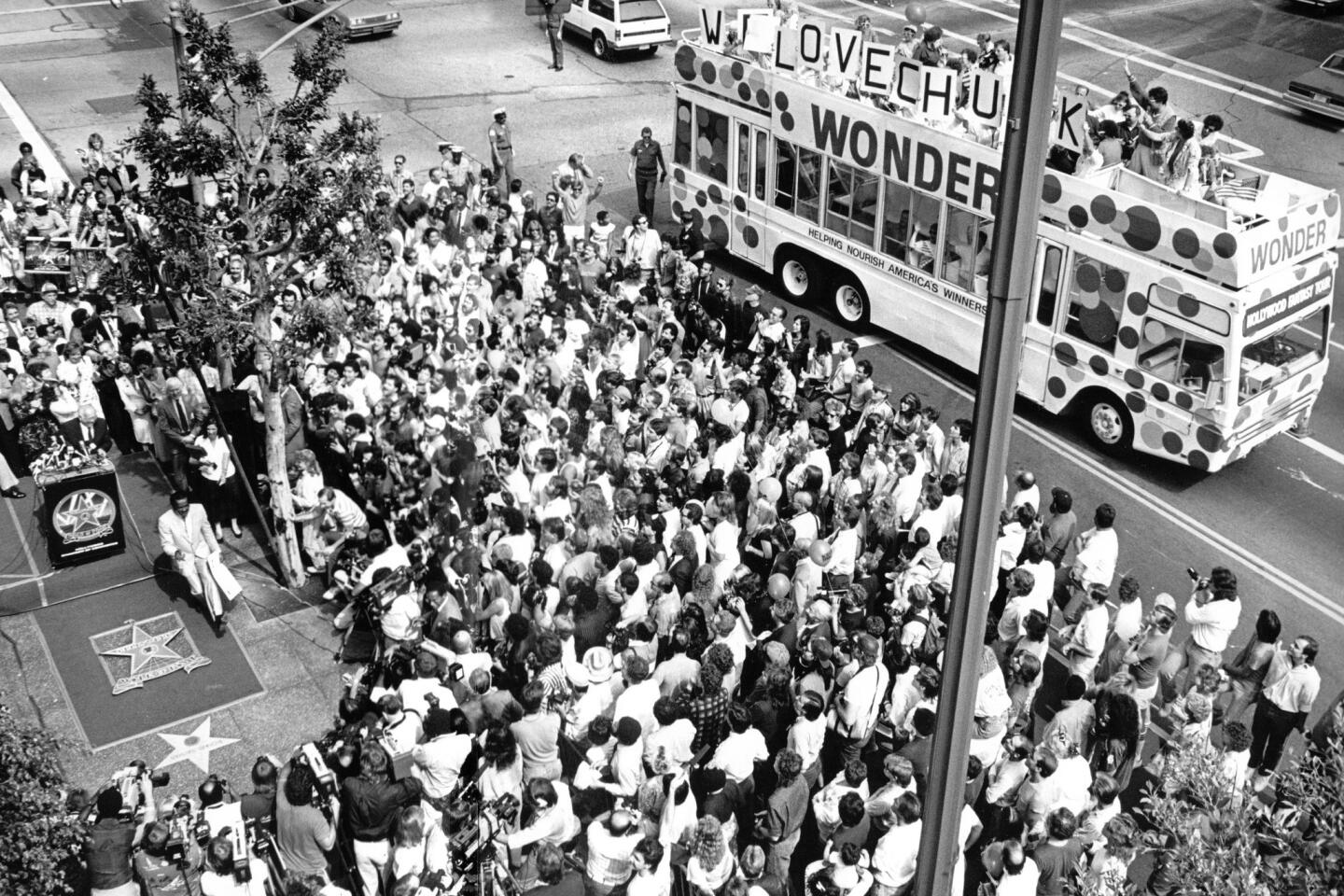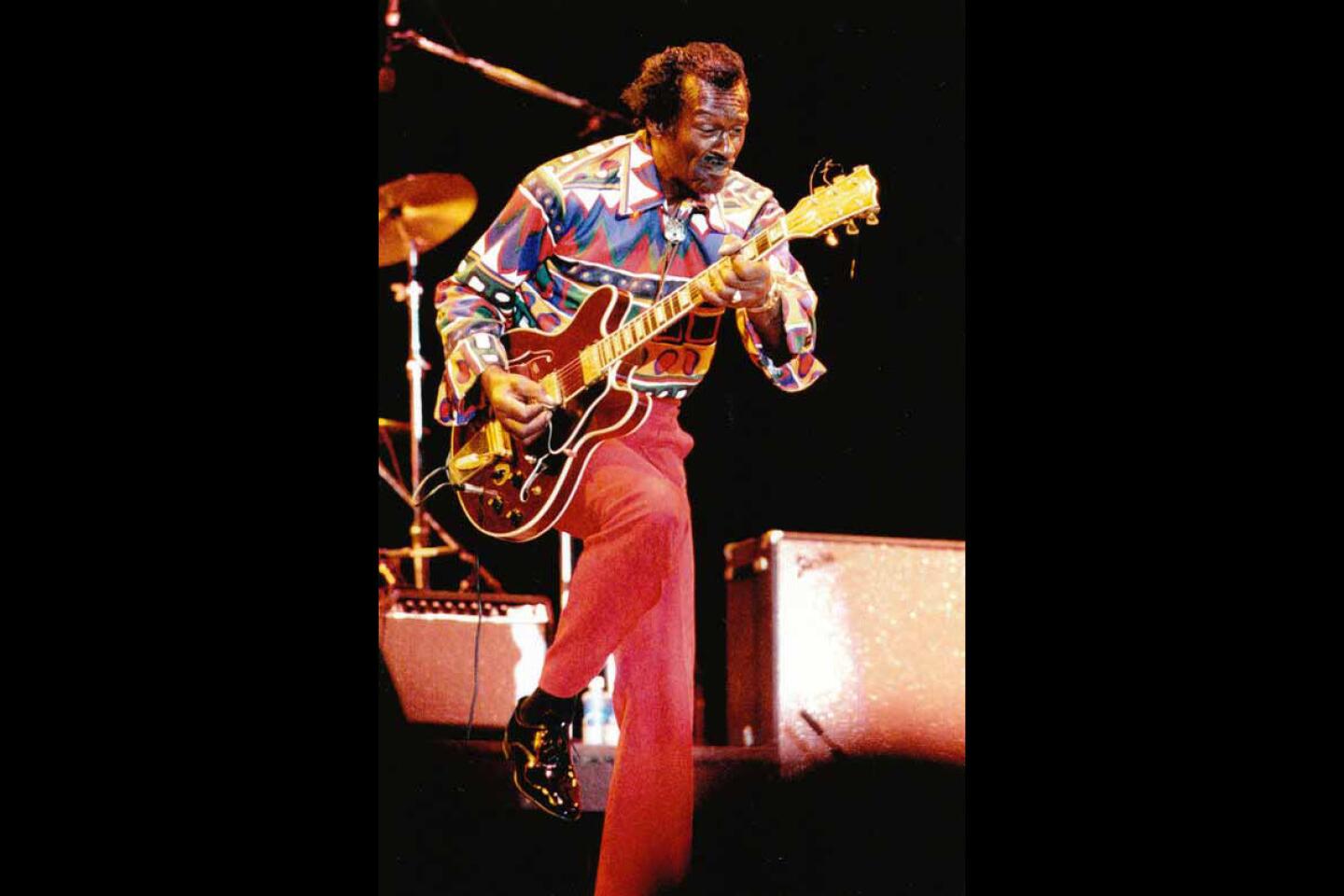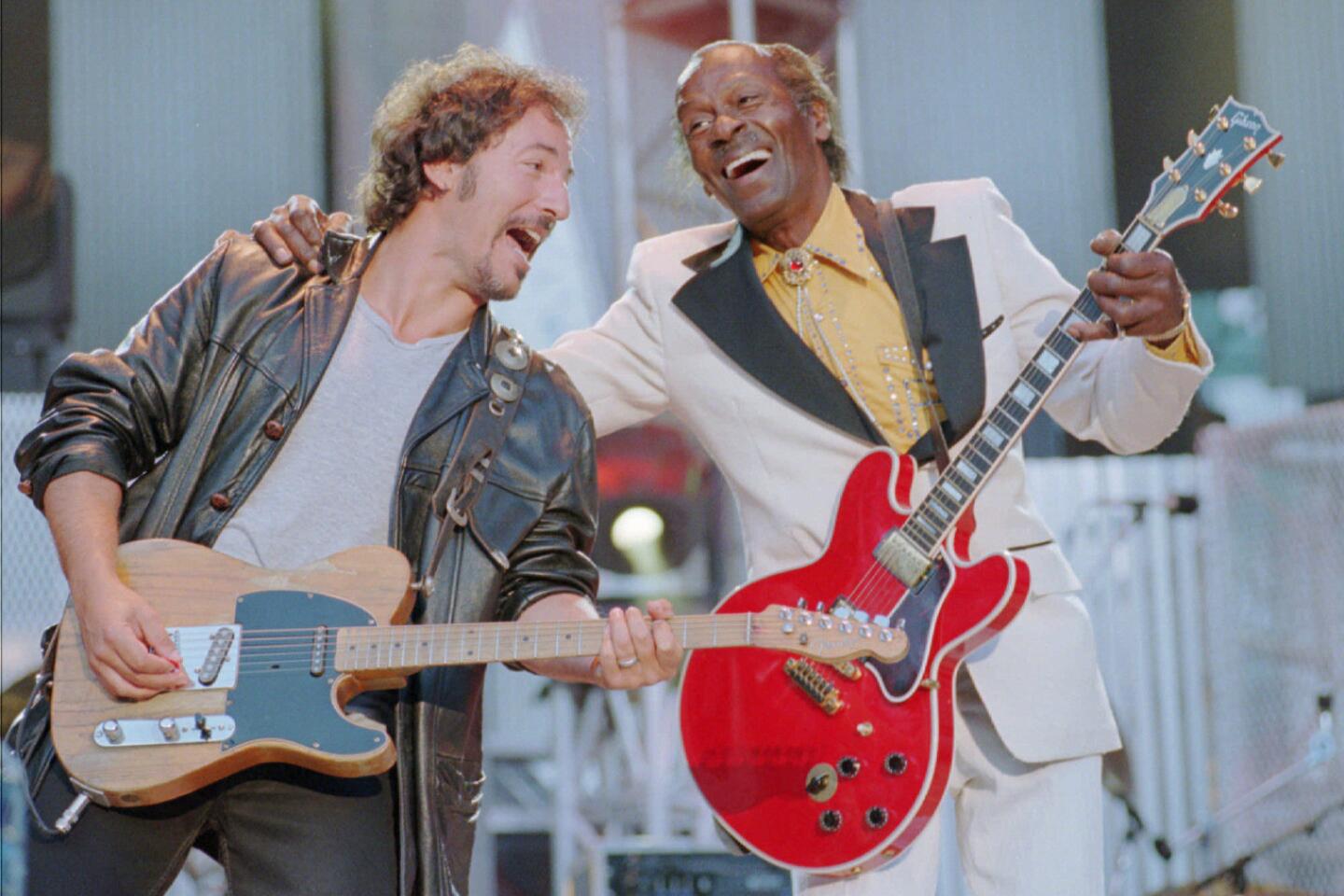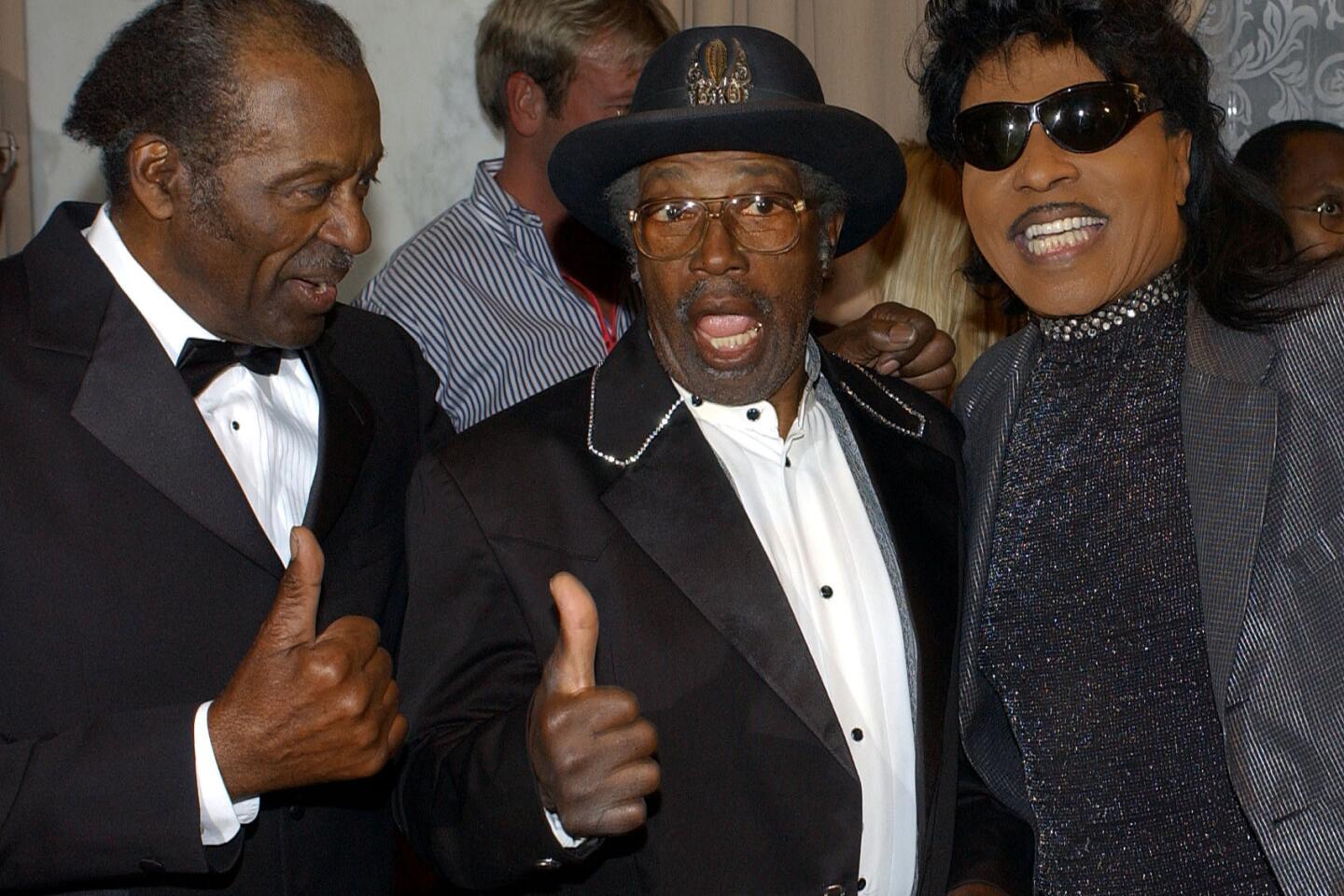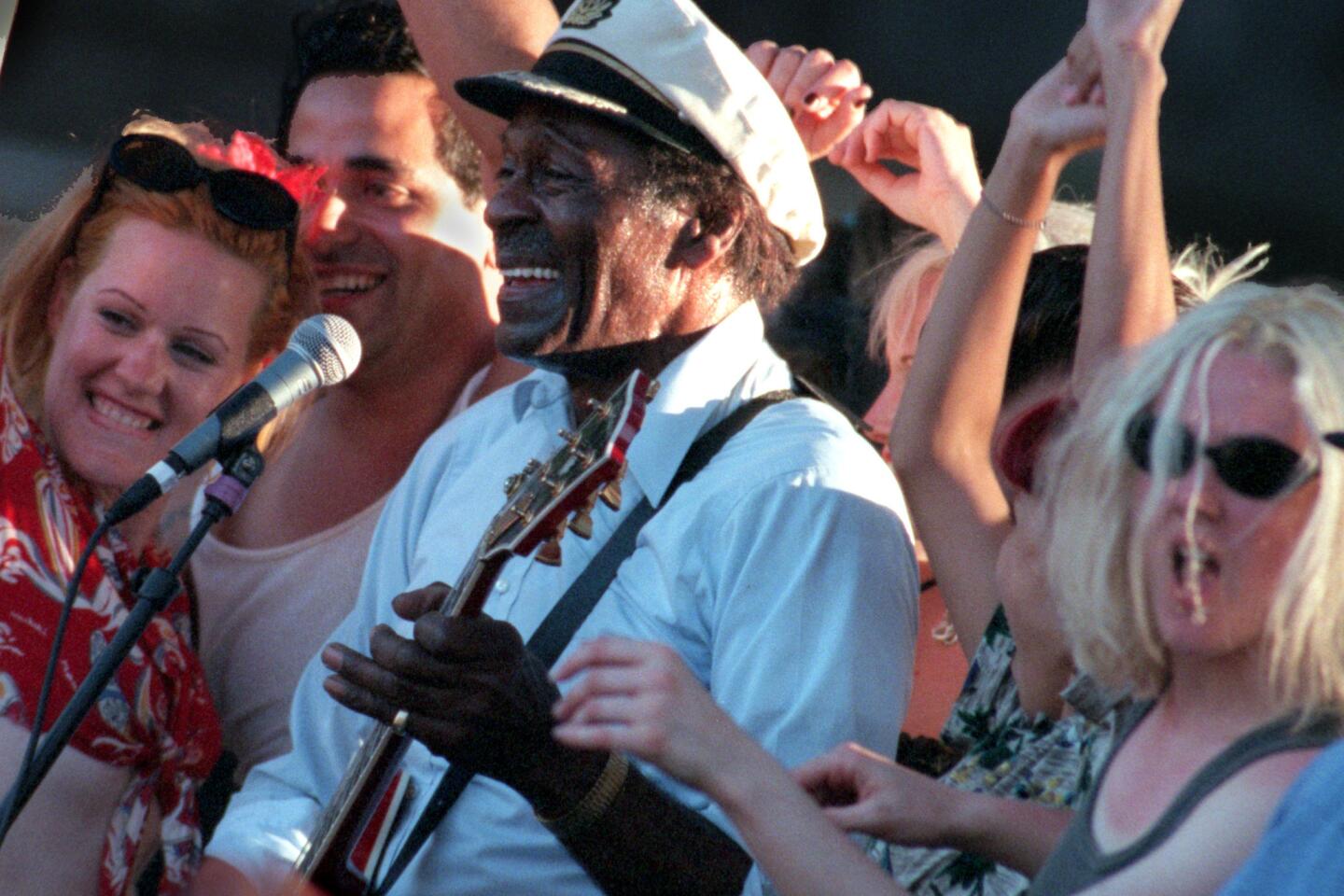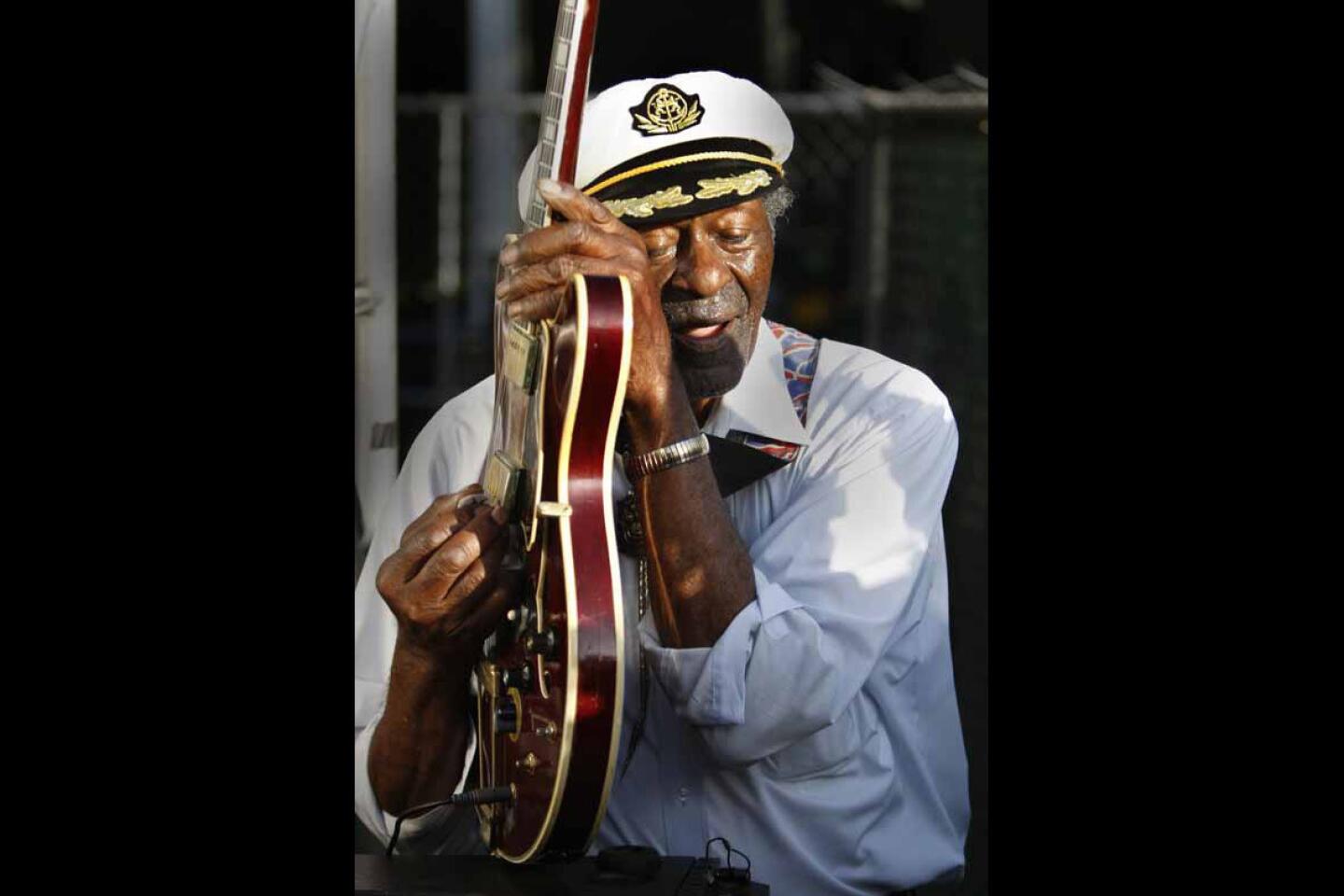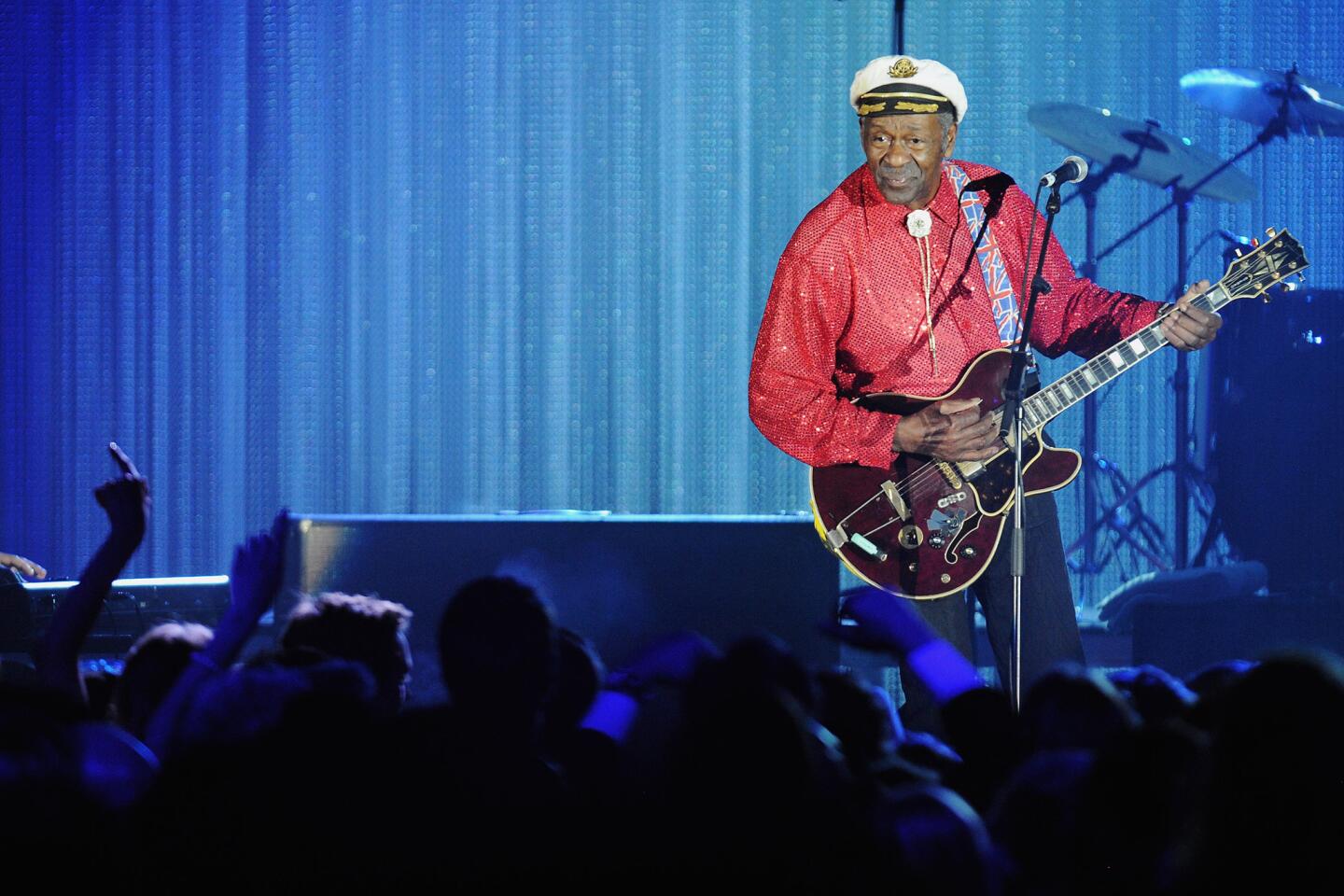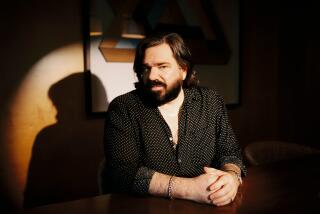From the Archives: How Chuck Berry managed to look and sound so good even in his later years
- Share via
Editor’s Note: Rock ‘n’ roll legend Chuck Berry died March 18, 2017. He was 90. The following is an interview with Berry, where he talks about performing in his later years.
Nobody batted an eye four decades ago when Mick Jagger suggested how silly it would be for him to still be singing odes to teen lust once he’d turned 50. His comment conjured what seemed, back then, a preposterous image of middle-aged men practicing what was created as a young man’s art.
So how on earth did Chuck Berry, who turned 75 last October, manage to look and sound so gloriously ageless Saturday at the Universal Amphitheatre as he sang about “Sweet Little Sixteen” and ordered Beethoven to roll over once more?
His co-headliner, Little Richard, couldn’t do it even though he’s six years Berry’s junior. Rock’s original wild man appeared game but huffed and puffed his way through a set that only intermittently transcended rote nostalgia, then left the building immediately, scotching the scheduled musical meeting of two of rock’s founding fathers.
Berry, on the other hand, was so full of vitality you wanted to X-ray that old Gibson guitar of his to find the flask he must have filled at the fountain of youth.
The spirit, spontaneity and energy rock’s first poet put into his hourlong set was all the more remarkable in light of decades of half-hearted performances in which he typically battled rather than meshed with unrehearsed musicians hired for him in each town.
At Universal he was backed by a lively trio consisting of fellow St. Louis musician Jim Marsala on bass, who has accompanied Berry off and on for four decades, plus pianist Michael Clark and drummer Kirk Arthur, both of whom have played with him regularly for some 13 years.
Evidently the monthly club gigs he’s been doing back in St. Louis for the last five years have reminded him that it takes a real band to really rock. It also seems to have rekindled his passion for honest expression in concert as well as his respect for his audience and his own legacy.
“It must still be fun, because I don’t have to hit a lick anymore,” Berry acknowledged during an interview Thursday in his dressing room at “The Tonight Show With Jay Leno” before a joint appearance that night with Richard. The implication was that fans will cheer this first-round Rock and Roll Hall of Famer no matter what he does, or doesn’t do, on stage at this point in his career.
“What keeps me going is the fact that I appreciate that response,” Berry added. “Plus I’m still learning, and that’s a big part of my life--to learn. These guitar strokes I’m learning, still learning--yes, it’s fun. Anybody would understand it’s fun.” So much fun, in fact, that Berry swears 2002 will be the year he puts out an album of new material he’s been talking about for the better part of Britney Spears’ lifetime.
He also clearly still has fun with playing with words, something that sets his richly detailed songs apart from often generic declarations of love and longing common during rock’s embryonic stage. That unyielding desire for the specific came out in the interview, when he was briefly stumped upon being asked whether it’s harder to keep performing long after most of his contemporaries have retired or died.
What keeps me going is the fact that I appreciate that response.
— Chuck Berry
“Break down ‘harder’ for me,” he said, with one of many laughs that also contradicted his reputation as a man who endures interviews as if at gunpoint.
Restated to ask if he found performing more taxing, more tiring or as much fun as when he was helping define the archetype of the electric guitar-wielding songwriter-performer in the mid-’50s, Berry relaxed and answered.
“Yes, it’s more tiring, but since I don’t do it as much as I used to, it’s not really that much more taxing. See why I couldn’t answer the question before?”
He sighs, then adds, “Ahh, I should have been a son of Einstein,” slyly rolling his eyes at his canny syntactic analysis.
Einstein’s name surfaces again later when Berry outlined the philosophy that, despite his three prison terms and various personal and professional quagmires, may have saved him from reaching the point of no return on the road to self-destruction like so many other rockers.
“One of my realizations is that if you revel over joy,” he says, “you’re going to ache over pain and get killed over hurt. Your span of feelings are going to go just as far one way as the other. So when something real good comes to you, take it and chew on it.... Then when something bitter gets in there, you won’t feel too bad chewing it and smiling, because the other one wasn’t that good, so this won’t be that bad.... That’s mathematical, and I think Einstein would have agreed with that.”
Few could argue that while much of the repertoire created during rock’s infancy can sound dated or corny, Berry’s canon holds up magnificently. That’s due in large part to the fact that he wrote from the perspective of an observer rather than a participant, and a gifted storyteller never gets old or goes out of fashion.
Still, Berry says he’s long past discussing hotrods and teenage romance. “Now I’m writing about the life I’m living, and the life my generation is living--and the generation right behind me is close to [that life], so they can look forward to it.” He quickly reels off a couplet from one new song, “A builder built a temple/He wrought it with grace and skill,” noting, “Now that has nothing to do with ‘Come back, baby.’”
It’s anybody’s guess how Elvis would come off issuing warnings about his blue suede shoes as he reached Social Security age, but on Saturday Berry went beyond merely credible. He tapped in-the-moment joy singing of the “rolling arthritis sitting down by the rhythm revue” in “Roll Over Beethoven” all these years later.
“Years?” he said during the interview. “I got news for you--so far it’s life. Elvis’ songs will always be there, and I hope mine will be after I’m gone.
“But,” he interjected with a twinkle in those 75-year-old eyes, “you can’t compare that, because he’s gone, and I’m not!”
ALSO
From the Archives: Chuck Berry sets the record straight
Chuck Berry, 90, will release his first new album in four decades, ‘Chuck’
More to Read
The biggest entertainment stories
Get our big stories about Hollywood, film, television, music, arts, culture and more right in your inbox as soon as they publish.
You may occasionally receive promotional content from the Los Angeles Times.
